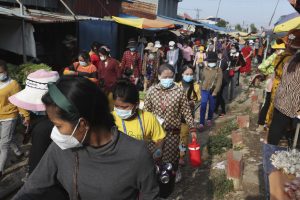A record surge in confirmed COVID-19 cases has left Cambodians stranded and indoors with the government extending a night time curfew after banning sales of alcohol, closing borders between 24 provinces, and introducing prison sentences for those who breach the rules.
Almost all shops have shuttered while restaurants are allowed to offer take-away food services only. Lockdowns the size of a city block around COVID-19 hotspots are a regular occurrence. Nearly all confirmed cases involve the U.K. variant of the disease.
“I accept being called a dictator, but I will also be admired for protecting my people’s lives,” Prime Minister Hun Sen told Cambodians when announcing prison terms of up to 20 years for people who breach quarantine rules. Curfew has been extended until April 28.
“People who break COVID-19 measures must be sentenced.” he said.
Prison terms will also be meted out for people who test positive and refuse medical treatment or evade the authorities while bureaucrats, military personnel, and the judiciary have been warned they will be fired if they refuse vaccinations
The severity of the crackdown prompted a warning from United Nations experts that the anti-COVID measures – and in particular publication of the private details of patients – could undermine fundamental human rights.
“We are concerned that the administrative and penal measures, including excessive prison sentences and fines provided in the law, appear to be disproportionate and unwarranted,” the experts said in a joint statement. Among them was Rhona Smith, the special rapporteur on the situation of human rights in Cambodia.
But that is unlikely to merit much attention in a country that has ground to a halt.
It’s a far cry from the Cambodian experience during the first year of the pandemic when the government was praised for its handling of the disease, closing its sovereign borers and imposing social distancing rules and encouraging face masks early.
But that has changed dramatically.
Cambodia’s third local outbreak – known locally as the February 20 Community Event – has been traced to two young Chinese women who bribed a guard, breached quarantine, and went partying in Phnom Penh nightclubs.
Since then confirmed cases have soared to 4,696 with at least 33 deaths, which compares with just 484 cases and no deaths for an entire year, before February 20.
That prompted officials to turn conference halls into hospital wards in anticipation that case loads can only rise substantially, highlighting the potency of the U.K. variant. The dire forecasts are backed by the World Health Organization (WHO), which has issued “a stark warning.”
“We stand on the brink of a national tragedy because of COVID-19. Despite our best efforts, we are struggling to control the virus,” said Dr. Li Ailan, WHO Representative to Cambodia, urging people to stay at home for Khmer New Year this week “to protect your family, community and country.”
“New cases occur every day and we are racing against the virus,” Ailan said. “Unless we can stop the outbreak, Cambodia’s health system is at high risk of being overwhelmed, which would have disastrous consequences.”
Of the few recent bright spots is the country’s rollout of its vaccination program.
The health ministry says about 1 million Cambodians have been vaccinated against the disease, out of a population of 16 million, since February 10.
The government intends to inoculate 10 million of its citizens, initially with AstraZeneca and Chinese-made vaccines.
Australia has emerged as its biggest donor with a pledge of US$28 million to help vaccinate 1.5 million people through a Covax facility to be approved by the WHO.
China initially promised 1 million doses of its Sinopharm vaccine, enough to inoculate 500,000 Cambodians (the vaccine requires two jabs for each person). A second batch has been promised while 1.5 million doses of another vaccine are being purchased from Chinese drug maker Sinovac Biotech.
Luke Hunt can be followed on Twitter @lukeanthonyhunt

































